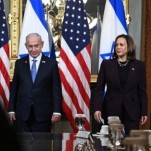Kamala Harris ‘Won’t Be Silent’ on Suffering in Gaza—But Didn't Mention Arms Embargo

Since Vice President Kamala Harris became the presumptive Democratic nominee this week, many have been waiting for more clarity on her position on what’s widely considered the greatest failure of the Biden administration: Israel’s war on Gaza. Even before Biden’s disastrous June 27 debate, there were concerns that the vast unpopularity of his role as a facilitator in the war could cost him the election. On Thursday, after meeting with Israeli Prime Minister Benjamin Netanyahu, Harris said she used her time with him to stress the "dire" urgency of ending the war. “I will not be silent,” Harris said. “What has happened in Gaza over the past nine months is devastating. The images of dead children and desperate hungry people fleeing for safety, sometimes displaced for the second, third or fourth time.” Harris measured her comments with the usual lines—that “Israel has a right to defend itself,” though she pointedly added that “how it does so matters.” “We cannot look away in the face of these tragedies," she said. "We cannot allow ourselves to become numb to the suffering.” Netanyahu’s widely protested visit to D.C. this week comes as the International Criminal Court seeks a warrant for his arrest for war crimes in Gaza. For months now, the Israeli leader has overseen a genocidal campaign against Gaza that’s killed an estimated 40,000 Palestinians, about half of whom are children. Still, Biden has at times bypassed Congress to send Israel more weapons. VP: What has happened in Gaza over the past nine months is devastating. The images of dead children and desperate hungry people fleeing for safety sometimes displaced for the second, third, or fourth time. We cannot look away in the face of these tragedies pic.twitter.com/SOlgMaOJAf — Acyn (@Acyn) July 25, 2024 Many have observed that Harris’ statements mark a tonal shift from the president, who famously questioned whether death tolls reported by the Gaza Health Ministry in October were legitimate. The Wall Street Journal reported this week that if elected, Harris is unlikely to retain the Biden administration officials who have been leading the policy on Gaza, like Secretary of State Antony Blinken. Despite these signals that a Harris administration might be more sympathetic to the plight of Palestinians, Harris’ official policy positions remain largely unclear. On Tuesday, seven labor unions, together representing six million workers, signed a letter calling on the president to stop sending weapons to Israel. Harris didn’t address this demand or her position in her Thursday remarks. The vice president maintained after their meeting that she implored Netanyahu to agree to a ceasefire and hostage release deal to end the war: “As I just told Prime Minister Netanyahu, it is time to get this deal done.” To the ire of family members of Israeli hostages, Netanyahu has repeatedly rejected permanent ceasefire deals that would bring them home. And while Harris might call for a ceasefire, Israel’s continued war on Gaza is made possible by weapons that the U.S. sends to Israel. Prior to Harris’ meeting with Netanyahu on Thursday, the vice president also released a statement condemning the methods of some pro-Palestine protesters in D.C. "I condemn the burning of the American flag. It should never be desecrated in that way,” Harris wrote, also condemning messages that appeared supportive of Hamas. As hundreds of thousands of Democratic, uncommitted voters call on Harris to earn their votes by pledging not to send more weapons to Israel, and proactively work to facilitate a ceasefire, Harris appears to be walking a fine line: She's attempting to signal more sympathy toward Palestinians, while not straying too far from the position of…
